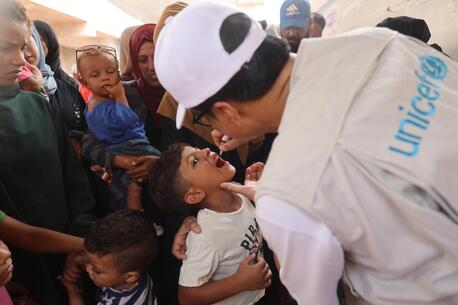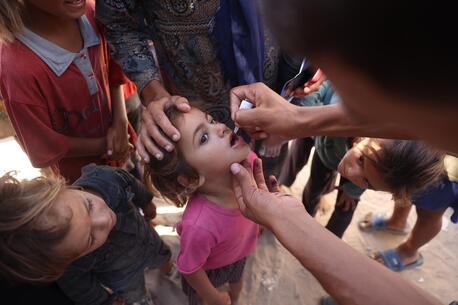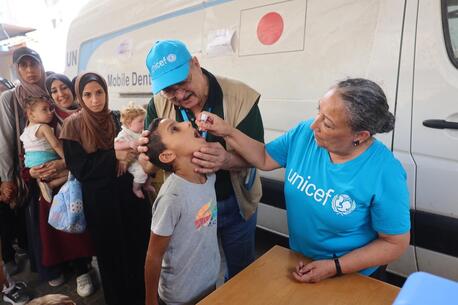
Wild Polio Eliminated in Africa: A Giant Step Closer to Eradication
To make the entire world safe from polio, every child in every household must be vaccinated. UNICEF is resuming immunization campaigns disrupted by COVID-19 worldwide — including in Pakistan and Afghanistan, the only remaining polio-endemic countries.
In August 2020, global public health reached a huge milestone when Africa was officially declared wild poliovirus-free by the Africa Regional Certification Commission. Five of the six WHO regions — representing more than 90 percent of the world's population — are now free of the wild poliovirus.
This remarkable achievement for the continent is a leap forward on the road to global polio eradication. To make the entire world safe from polio, a highly infectious, paralyzing and sometimes fatal disease that mainly affects children under the age of 5, every child in every household must be vaccinated.
Nigeria was the last country on the continent to eliminate the wild poliovirus
Thanks to the dedicated efforts of thousands of health workers, traditional and religious leaders, parents and country leaders, African nations have immunized hundreds of millions of children across the 47 countries in the WHO African region with polio vaccines and strengthened surveillance networks to detect and immediately respond to any lingering traces of the virus. Nigeria was the last country on the continent to be certified wild poliovirus-free.

Children under 5 are particularly vulnerable to polio. Above, a baby receives polio vaccine at Jupanziri Health Center III in Uganda's Nebbi district as part of a UNICEF-supported national mass vaccination campaign in 2019. © UNICEF/UNI330156/Bongyereirwe
Since 1988, polio cases worldwide have decreased by 99.9%
UNICEF and partners in the Global Polio Eradication Initiative (GPEI) — including Rotary International and the Bill & Melinda Gates Foundation — are working together to end polio worldwide. Since UNICEF and Rotary International began their partnership in 1988, polio cases have decreased by 99.9 percent. Just 176 polio cases were confirmed worldwide in 2019, down from about 1,000 cases per day in the 1980s.
In Pakistan and Afghanistan, vaccination campaigns interrupted by COVID-19 have resumed
Africa's victory over wild poliovirus represents significant progress, but as long as polio exists anywhere, it remains a threat everywhere.
The polio virus continues to circulate in parts of Pakistan and Afghanistan, the last two polio-endemic countries in the world. In March 2020, 50 million children missed out on their polio vaccinations after immunization campaigns were halted in both Afghanistan and Pakistan to avoid the risk of COVID-19 transmission to children, caregivers and vaccinators themselves. As a result, reported polio cases have risen to 34 in Afghanistan and 63 in Pakistan, including some in previously polio-free parts of the country.
Now polio vaccinations have resumed in Afghanistan and Pakistan, with new guidelines and personal protective equipment for frontline health workers to prevent the spread of COVID-19.

A child’s finger is marked after he is vaccinated against polio. UNICEF-supported vaccinators went door-to-door in his neighborhood of Kart-e-Naw, a suburb of Kabul, Afghanistan. © UNICEF/UN0339995/Frank Dejongh
“These lifesaving vaccinations are critical if children are to avoid yet another health emergency,” said Jean Gough, UNICEF Regional Director for South Asia.
“As the world has come to see only too well, viruses know no borders and no child is safe from polio until every child is safe. Although we have experienced new challenges and a setback in the fight against polio because of COVID-19, the eradication of this contagious disease will get back on track and is firmly within our reach."

A baby is vaccinated against in polio in Jalalabad, Afghanistan in August 2020 as UNICEF-supported vaccination campaigns resume after a temporary halt caused by the COVID-19 pandemic. © UNICEF/UNI357134/
Lessons learned in the fight against polio are informing the COVID-19 response
Stopping wild polio in Africa has brought far-reaching benefits beyond saving children from paralysis. The polio program's massive infrastructure and skills in immunization campaigns, disease surveillance and outbreak response are playing a critical role in the battle against COVID-19, providing broader health services to communities in need and protecting children from other vaccine-preventable illnesses.
UNICEF's expertise in vaccine delivery will be crucial to the success of COVID-19 immunization efforts around the world, once a vaccine is approved for distribution. UNICEF is spearheading efforts to procure and supply future COVID-19 vaccines, as part of the global vaccine plan of the COVID-19 Vaccine Global Access (COVAX) Facility led by Gavi, the Vaccine Alliance. UNICEF has already begun stockpiling syringes and other critical equipment, prepositioning them in its warehouses around the world for rapid deployment.
UNICEF and partners are working to keep kids safe from disease around the world
UNICEF is working with partners worldwide to strengthen health care systems and ensure that children receive their routine immunizations during the COVID-19 pandemic. “Vaccines are one of the most powerful tools in the history of public health, and more children are now being immunized than ever before,” said Dr Tedros Adhanom Ghebreyesus, WHO Director-General.
“The pandemic has put those gains at risk. The avoidable suffering and death caused by children missing out on routine immunizations could be far greater than COVID-19 itself. But it doesn’t have to be that way. Vaccines can be delivered safely even during the pandemic, and we are calling on countries to ensure these essential lifesaving programs continue.”
Top photo: Children come running to greet UNICEF staff and a team of Rotary International polio vaccinators in a remote region of northeastern Uganda in 2018. © Jon Riera for Rotary International
HOW TO HELP
There are many ways to make a difference
War, famine, poverty, natural disasters — threats to the world's children keep coming. But UNICEF won't stop working to keep children healthy and safe.
UNICEF works in over 190 countries and territories — more places than any other children's organization. UNICEF has the world's largest humanitarian warehouse and, when disaster strikes, can get supplies almost anywhere within 72 hours. Constantly innovating, always advocating for a better world for children, UNICEF works to ensure that every child can grow up healthy, educated, protected and respected.
Would you like to help give all children the opportunity to reach their full potential? There are many ways to get involved.





